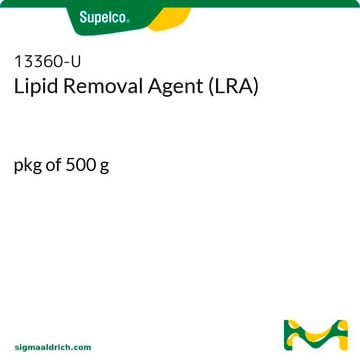13358-U
Lipid Removal Agent (LRA)
pkg of 100 g
Synonym(s):
mix moxde ion exchange resin
Sign Into View Organizational & Contract Pricing
All Photos(1)
About This Item
Recommended Products
grade
reagent grade
Quality Level
form
powder
packaging
pkg of 100 g
technique(s)
LPLC: suitable
surface area
120 m2/g
matrix
Silica
matrix active group
silica
particle size
325 mesh
pore size
90 Å mean pore size
General description
Lipid removal agent is a synthetic adsorbent of crystalline calcium silicate hydrate which is used for removing lipids and endotoxin from plasma or aqueous solutions. It is also used for DNA purification to remove protein, RNA and genomic DNA.
Application
- Lipid removal agent (LRA) was used for absorption of lipids using gel permeation chromatography.
- LRA was used to isolate lipoprotein particles from coeluting proteins in collected fraction from Gel filtration chromatography.
Storage Class Code
11 - Combustible Solids
WGK
WGK 1
Flash Point(F)
Not applicable
Flash Point(C)
Not applicable
Personal Protective Equipment
dust mask type N95 (US), Eyeshields, Gloves
Choose from one of the most recent versions:
Already Own This Product?
Find documentation for the products that you have recently purchased in the Document Library.
Toshihiro Sakurai et al.
The Journal of pharmacology and experimental therapeutics, 356(2), 341-353 (2015-11-18)
Apolipoprotein C-II (apoC-II) is a cofactor for lipoprotein lipase, a plasma enzyme that hydrolyzes triglycerides (TGs). ApoC-II deficiency in humans results in hypertriglyceridemia. We used zinc finger nucleases to create Apoc2 mutant mice to investigate the use of C-II-a, a
Stephen W C Chung et al.
Journal of chromatography. A, 1218(33), 5555-5567 (2011-07-12)
Organochlorine pesticide (OCP) residues in foods have been of concern for several decades. However, the analysis of some of the OCPs and their metabolites or derivatives, such as endrin aldehyde, endrin ketone, nonachlor, etc. in fatty foods (including foods of
John P Zhang et al.
Biotechnology progress, 21(4), 1220-1225 (2005-08-06)
A synthetic adsorbent of crystalline calcium silicate hydrate, the product LRA by Advanced Minerals Corp., has been studied for endotoxin removal from aqueous solutions. This adsorbent removes endotoxin effectively, and the removal is greatly enhanced by the presence of an
Scott M Gordon et al.
Journal of proteome research, 9(10), 5239-5249 (2010-08-20)
Plasma levels of high density lipoprotein cholesterol (HDL-C) are inversely proportional to the incidence of cardiovascular disease. Recent applications of modern proteomic technologies have identified upward of 50 distinct proteins associated with HDL particles with many of these newly discovered
Karol Kaiser et al.
Nature communications, 10(1), 1498-1498 (2019-04-04)
WNTs are lipid-modified proteins that control multiple functions in development and disease via short- and long-range signaling. However, it is unclear how these hydrophobic molecules spread over long distances in the mammalian brain. Here we show that WNT5A is produced
Our team of scientists has experience in all areas of research including Life Science, Material Science, Chemical Synthesis, Chromatography, Analytical and many others.
Contact Technical Service





